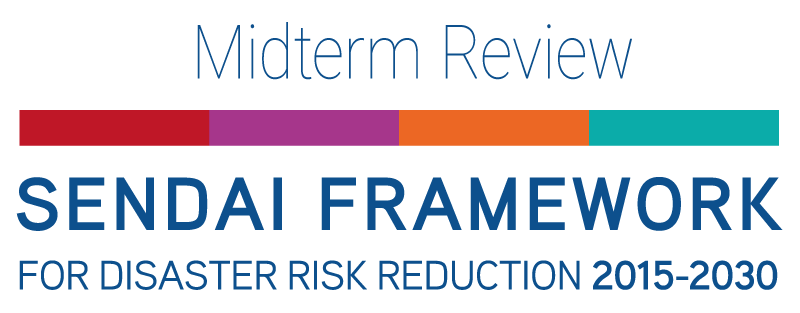About the Sendai Framework Midterm Review
Called for by the UN General Assembly (Resolution A/RES/75/216) the “midterm review of the implementation of the Sendai Framework (MTR SF) [will] assess progress in integrating disaster risk reduction into policies, programmes and investments at all levels, identify good practice, gaps and challenges and accelerate the path to achieving the goal of the Sendai Framework and its seven global targets by 2030”. States recognise that “the Sendai Framework….provides guidance relevant to a sustainable recovery from COVID-19 and [….] to identify and address underlying drivers of disaster risk in a systemic manner”.
Through consultations and review of States and other stakeholders, the MTR SF will assess progress made, examine challenges experienced in preventing new and reducing existing disaster risk, explore context shifts and new and emerging issues, with the view to identifying renovations to risk governance and risk management approaches and mechanisms able to contend with 21st century challenges, amplifying and accelerating action in all sectors and at all scales through to 2030 and beyond, in pursuit of the outcome and goal of the Sendai Framework, “Our Common Agenda” of the Secretary-General and risk-informed sustainable and regenerative development.
As both a retrospective and prospective exercise, the MTR SF process aims to:
- Prompt deep reflections in the COVID reality on how we understand the systemic nature of risk, our relationship with it, and how we can reduce disaster risk and loss.
- Support integrated partnerships and actions that harness what we know and what we do, to shape how we choose, interact and decide.
- Build collective intelligence to establish new ways of knowing risk and new forms of collaboration that mean risk governance and management mechanisms and approaches are no longer overwhelmed.
- Develop policy options, and new modalities of implementation through recommendations for Governments and other stakeholders to accelerate realisation of the goal and outcome of the Sendai Framework and risk-informed sustainable development.
Consultations and review – conducted at all levels involving and led by States and non-State stakeholders – will generate critical analysis to assist countries and stakeholders develop recommendations for prioritised, accelerated and integrated international, national and local cooperation and action in the period 2023 to 2030, and to initiate nascent thinking on possible international arrangements for risk-informed sustainable development beyond 2030.
The findings of the MTR SF will be consolidated in a report on the MTR SF, which will inform a high-level meeting of the General Assembly in New York on 18 and 19 May 2023. The meeting will adopt a concise and action-oriented political declaration to renew commitment and accelerate the implementation of the Sendai Framework, and which will inform the quadrennial review of the SDGs at the ECOSOC High-level Political Forum on Sustainable Development in July of 2023, the SDGs Summit, and the UN Secretary General’s Summit of the Future, at the 78th Session of the UN General Assembly in September 2023.
